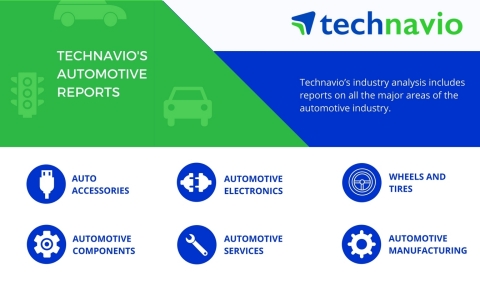LONDON — (BUSINESS WIRE) — January 11, 2018 — Technavio market research analysts forecast the global automotive augmented reality and virtual reality market to grow at a CAGR of more than 98% during the forecast period, according to their latest report.
This press release features multimedia. View the full release here: http://www.businesswire.com/news/home/20180111006001/en/

Technavio has published a new market research report on the global automotive augmented reality and virtual reality market 2017-2021 under their automotive library. (Graphic: Business Wire)
The report further segments the global automotive augmented reality and virtual reality market by technology (augmented reality (AR) and virtual reality (VR)) and by geography (the Americas, APAC, and EMEA).
This report is available at a USD 1,000 discount for a limited time only: View market snapshot before purchasing
Buy 1 Technavio report and get the second for 50% off. Buy 2 Technavio reports and get the third for free.
Technavio analysts highlight the following three market drivers that are contributing to the growth of the global automotive augmented reality and virtual reality market:
- AR for automotive repairs
- Electrification of automotive mechanics
- Emergence of virtual reality showrooms
Looking for more information on this market? Request a free sample report
Technavio’s sample reports are free of charge and contain multiple sections of the report including the market size and forecast, drivers, challenges, trends, and more.
AR for automotive repairs
Presently, vehicle manufacturing involves more complications because of the presence of many electric and electronic components. On average, a modern-day car has more than 100 electronic parts that have made driving convenient, safe, and comfortable for drivers. However, technicians should possess a high skill set as repairing vehicles with complicated circuit design is difficult. The use of AR technology simplifies the repair work, as it gives complete instructions, from a repair process to suitable tools that need to be used.
According to Amey Vikram, a lead analyst at Technavio for automotive electronics research, “BMW has designed a pair of glasses that provide the user with some step-by-step instructions on how to fix the engine. There is no need for any experience in repairing the vehicle because the AR glasses show every instruction such as how to disassemble an engine or in which direction the screw needs to be turned. After the creation of AR glasses for BMW service engineers, Metaio, an augmented reality firm developed a similar app for Google Glass.”
Electrification of automotive mechanics
Presently, innovations in the automotive industry are driven by government regulations. The automotive industry is highly dependent on electronics to guarantee compliance with regulations. Automotive is one of the largest contributors to environmental pollution. Therefore, various government norms are framed across the world to reduce vehicle emissions and to increase fuel economy. The growing demand for vehicle safety and better performance from customers has compelled the OEMs to increase electronic content in vehicles.
Electrification of vehicles is one of the key drivers influencing the automotive industry. Furthermore, electrification of powertrain, infotainment, safety systems, connected vehicles, and electronics are other factors driving the industry. Previously, the role of electronics was largely limited to switches for headlights or ignition systems. But, modern vehicles are equipped with high-end electronics and use advanced technologies such as automotive sensors, collision avoidance systems, infotainment, connected systems, and drive-by-wire technologies
Emergence of virtual reality showrooms
The vehicles manufactured by OEMs reach end-users through distributors and dealers. This adds to the overall cost of the vehicle and takes more time for delivery. End-users prefer to choose their vehicles after looking at its physical appearance and undertaking a test drive. The dealers need to have a larger space to showcase more models of vehicles. End-users must visit showrooms to view and test drive the vehicle. The increasing space congestion and road traffic reduce the possibility of exploring all the options in a vehicle.
“Virtual reality showrooms allow users to view vehicles by wearing a VR headset, wherein the users can choose the colors and interiors they want. The use of VR technology may change the downstream value chain of the automotive industry. As vehicles can be seen and tested virtually, there is no need for showroom space. As a result, OEMs can have direct contact with customers,” says Amey.








